Turkey and the EU - between myths and reality
Adelina Marini, Ralitsa Kovacheva, July 18, 2011
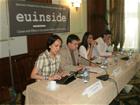 Is a mature and well motivated conversation about Turkey possible in Bulgaria, about Turkish EU membership? We were asking each other these questions while organising the discussion Turkey and the European Union: Formulas of a Common Future, together with Vladimir Shopov, Director of the European Institute for Strategies and Policies | espi and Plamen Ralchev, founder of StratCom. Our wish was to prove that it is not only possible but is also necessary, and that was leading us when choosing the topics and the speakers in order to achieve a balanced and correct conversation.
Is a mature and well motivated conversation about Turkey possible in Bulgaria, about Turkish EU membership? We were asking each other these questions while organising the discussion Turkey and the European Union: Formulas of a Common Future, together with Vladimir Shopov, Director of the European Institute for Strategies and Policies | espi and Plamen Ralchev, founder of StratCom. Our wish was to prove that it is not only possible but is also necessary, and that was leading us when choosing the topics and the speakers in order to achieve a balanced and correct conversation.
As starting point, espi's Director Vladimir Shopov summarised the arguments  FOR and AGAINST Turkey's membership in the EU. Among the FOR arguments is the geopolitical point - Turkey's largeness will have the role of a geostrategic multiplier and will help the EU to be a more convincing player on global stage. The economic and political arguments are well known and, besides, the EU will get a "civilisational bonus" by proving to itself and the world that it is not a Christian club and thus will receive higher international legitimacy and influence. The main argument AGAINST is related to cohesion - size is not the key factor for EU's influence but the extent of cohesion within, its ability to act with "one voice". In this regard Turkey's divergence, commented as cultural or civilisational, will reduce EU's ability to act uniformly.
FOR and AGAINST Turkey's membership in the EU. Among the FOR arguments is the geopolitical point - Turkey's largeness will have the role of a geostrategic multiplier and will help the EU to be a more convincing player on global stage. The economic and political arguments are well known and, besides, the EU will get a "civilisational bonus" by proving to itself and the world that it is not a Christian club and thus will receive higher international legitimacy and influence. The main argument AGAINST is related to cohesion - size is not the key factor for EU's influence but the extent of cohesion within, its ability to act with "one voice". In this regard Turkey's divergence, commented as cultural or civilisational, will reduce EU's ability to act uniformly.
According to Vladimir Shopov, for the future of accession negotiations and relations with Turkey at large, two processes will be very important. One is the crisis which the EU is going through in its attempt to adapt to globalisation. "Enlargement will be more and more assessed by European elites in terms of how the new member states behave and how their accession will impact the integration of economic and other European policies".
The second process is the new democratisation of the relations between the EU and its citizens. "Therefore Turkey should negotiate with the European citizens themselves, which creates a new and difficult dimension of relations". As euinside wrote many times, the problem with the integration of Turkish minorities in Western Europe will inevitably have an impact on these citizens' attitudes for Turkey and the public opinion has a saying when political decisions are being taken.
 Dimitar Bechev from the European Council on Foreign Relations (ECFR) described Turkey's accession negotiations as a "facade": "On the occasion of the negotiations we have to be blunt with the facts - since 2010 no chapter has been opened. 4 chapters are blocked by France because if they are to be opened, the result from the negotiations will be clear and it is membership". Currently Turkish foreign policy is entirely oriented to the Middle East and the relations with neighbours, not the EU, Mr Bechev deems.
Dimitar Bechev from the European Council on Foreign Relations (ECFR) described Turkey's accession negotiations as a "facade": "On the occasion of the negotiations we have to be blunt with the facts - since 2010 no chapter has been opened. 4 chapters are blocked by France because if they are to be opened, the result from the negotiations will be clear and it is membership". Currently Turkish foreign policy is entirely oriented to the Middle East and the relations with neighbours, not the EU, Mr Bechev deems.
He said that in Bulgaria many cliches circulate, many myths and many untruths, for example - there is no evidence of Turkey's expansionist policy. "Another big delusion is that Turkey is focused on the Balkans and especially on Bulgaria. The biggest cliche is that here the DPS (the Bulgarian political party representing the ethnic Turks in Bulgaria) is the 'fifth column' of Turkey - the latest visit of President Gul showed that the interstate dialogue is there and this is very important". According to Dimitar Bechev, the Middle East is a very central issue for Turkey, as well as Russia. "This policy is being built not on historical memories but on economic interests, on dealing with problems like national security and protection of national interest".
Although the negotiations with the EU are stuck, there is something that could 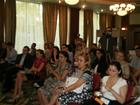 be done to improve EU-Turkey relations in the mid-term, Mr Bechev added. For example, international trade relations and the visas. A bilateral dialogue is needed to help coordinate the foreign policy, especially toward the Arab world. And precisely the Arab Spring is a good occasion to look at EU-Turkey relations through the prism of separate member states. The EU is a union of 27 member states with their own national interests. As a rule those countries that are farthest from Turkey in every aspect are also the most positive to Turkey's accession in the EU. Such a country is Spain, whose approach towards Turkey is entirely pragmatical.
be done to improve EU-Turkey relations in the mid-term, Mr Bechev added. For example, international trade relations and the visas. A bilateral dialogue is needed to help coordinate the foreign policy, especially toward the Arab world. And precisely the Arab Spring is a good occasion to look at EU-Turkey relations through the prism of separate member states. The EU is a union of 27 member states with their own national interests. As a rule those countries that are farthest from Turkey in every aspect are also the most positive to Turkey's accession in the EU. Such a country is Spain, whose approach towards Turkey is entirely pragmatical.
 This very interesting point of view in the debate was presented by Bozhana Stoeva from espi. The explanation is pragmatic - behind the Spanish support there are specific economic and political interests. Moreover, "Spain supports Turkey but it never says that it supports Turkey's membership to the EU", Ms Stoeva explained. Both sides have excellent economic relations and Spain is actively seeking the Turkish market - Turkey is its second largest destination for exports outside the EU after the US. A very important element is that in Spain the Turkish issue is impossible to be used to spspeculation with political aims: "The Turkish issue almost does not concern the society, the public opinion is not against membership. So the government has no benefit to play this card before elections, as is happening even now in France".
This very interesting point of view in the debate was presented by Bozhana Stoeva from espi. The explanation is pragmatic - behind the Spanish support there are specific economic and political interests. Moreover, "Spain supports Turkey but it never says that it supports Turkey's membership to the EU", Ms Stoeva explained. Both sides have excellent economic relations and Spain is actively seeking the Turkish market - Turkey is its second largest destination for exports outside the EU after the US. A very important element is that in Spain the Turkish issue is impossible to be used to spspeculation with political aims: "The Turkish issue almost does not concern the society, the public opinion is not against membership. So the government has no benefit to play this card before elections, as is happening even now in France".
But how do things look like from Bulgaria? Here talking about Turkey is based  on old, myths that have piled for more than 150 years and based on fear. The way it is being thought and spoken of Turkey reflects nationalistic and ideological accumulations and, as a result, we have developed a psychological complexity for Turkey, related to the narrative of slavery, Plamen Ralchev explained, founder of StratCom and professor at the University for National and World Economy. In Bulgaria there is a high degree of sensitivity on the matter which, however, is not very clear to what extent it is authentic or is manipulated.
on old, myths that have piled for more than 150 years and based on fear. The way it is being thought and spoken of Turkey reflects nationalistic and ideological accumulations and, as a result, we have developed a psychological complexity for Turkey, related to the narrative of slavery, Plamen Ralchev explained, founder of StratCom and professor at the University for National and World Economy. In Bulgaria there is a high degree of sensitivity on the matter which, however, is not very clear to what extent it is authentic or is manipulated.
Another problem, he said, was that the DPS is the way how the average Bulgarian perceives Turkey, which has the relevant impact on the attitude of this same Bulgarian towards our southern neighbour. The conversation about Turkey here is politically profane and manipulated additionally by the syndrome "the threat from Turkey". This, according to Mr Ralchev, should stop if we want to have a reasonable conversation about our relations with Turkey. He called for modesty and leaving the historical and emotionally political burden of the past.
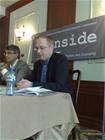 Alas, of how difficult Plamen Ralchev's recommendations are to be implemented speak the data, showed by Marin Lessenski with the Open Society Institute, about the public attitudes toward Turkey's membership in the EU. He compared two polls, answering one and the same question in 2008 and 2011. The question is "If a referendum is to be held on Turkey's accession in the EU, how would you vote?" The answers are surprising from two points of view. One is that the results in fact do not show that determination and primitivism in opinion, which occupies the public domain. In 2008 31.4% said they would support Turkey's membership in the EU, while 32.8 per cent were against. In 2011, 32.6% say "yes", while 44.4% say "no". The increase of the opponents actually is due to the people with no opinion.
Alas, of how difficult Plamen Ralchev's recommendations are to be implemented speak the data, showed by Marin Lessenski with the Open Society Institute, about the public attitudes toward Turkey's membership in the EU. He compared two polls, answering one and the same question in 2008 and 2011. The question is "If a referendum is to be held on Turkey's accession in the EU, how would you vote?" The answers are surprising from two points of view. One is that the results in fact do not show that determination and primitivism in opinion, which occupies the public domain. In 2008 31.4% said they would support Turkey's membership in the EU, while 32.8 per cent were against. In 2011, 32.6% say "yes", while 44.4% say "no". The increase of the opponents actually is due to the people with no opinion.
The second point of view with these data is how are they allocated politically. It is 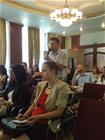 clear that the strongest supporters of Turkey's accession to the EU are DPS's sympathisers. And here there is a surprise too, as the result is not 100% as could have been expected. 82 per cent of those asked from the DPS are in support but there are 18% who are against. A paradox, according to Marin Lessenski, is the fact that supporters of the Blue Coalition (a coalition of right-wing parties, whose leadership is against Turkey's accession) are the second largest group of supporters. The interest thing here is that GERB (the ruling party) and the BSP (the socialists) have equal results - 30% "yes" vs. almost 50% "no". "In a possible referendum 21.50% of Ataka's supporters would vote "yes", 27.90% of BSP's supporters, 34.40% of GERB's, 44% of UDF's and 67% of DPS's would also support it", the data show.
clear that the strongest supporters of Turkey's accession to the EU are DPS's sympathisers. And here there is a surprise too, as the result is not 100% as could have been expected. 82 per cent of those asked from the DPS are in support but there are 18% who are against. A paradox, according to Marin Lessenski, is the fact that supporters of the Blue Coalition (a coalition of right-wing parties, whose leadership is against Turkey's accession) are the second largest group of supporters. The interest thing here is that GERB (the ruling party) and the BSP (the socialists) have equal results - 30% "yes" vs. almost 50% "no". "In a possible referendum 21.50% of Ataka's supporters would vote "yes", 27.90% of BSP's supporters, 34.40% of GERB's, 44% of UDF's and 67% of DPS's would also support it", the data show.
As Marin Lessenski explained, although the public opinion is not taken into account when forming Bulgaria's foreign policy, it is important these data to be known in order the public opinion not to be used in support of certain political arguments.
 According to Dr Evgenii Kanev, Chairman of the Board of espi, there is nothing frightening in Turkey's aggressive expansionist policy to Bulgaria in the past few years. On the contrary, Bulgaria should get an advantage of it. It is no accident that the issue was an accent during the visit on July 11 in Bulgaria of Turkish President Abdullah Gul, who brought with him a huge delegation of Turkish businessmen. Ankara's ambition is by 2023 to increase the volume of its exports to 500bn euro. For Bulgaria a target is set of increasing trade from its current levels of 4bn euros to 10bn euros.
According to Dr Evgenii Kanev, Chairman of the Board of espi, there is nothing frightening in Turkey's aggressive expansionist policy to Bulgaria in the past few years. On the contrary, Bulgaria should get an advantage of it. It is no accident that the issue was an accent during the visit on July 11 in Bulgaria of Turkish President Abdullah Gul, who brought with him a huge delegation of Turkish businessmen. Ankara's ambition is by 2023 to increase the volume of its exports to 500bn euro. For Bulgaria a target is set of increasing trade from its current levels of 4bn euros to 10bn euros.
But if the Turkish businessmen have expectations, which they had stated clearly again in Bulgaria too, the Bulgarian business also has expectations, Mr Kanev added. It is very difficult to do business in Turkey unless you have lobbyist support, as in the country the big businesses are controlled - the method of work of the holdings is well known and the military still has significant influence in the economy.
Turkey is no longer just a factor in the region, it is a factor globally as well, as  being part of the G20. Which is why the approach to it should be pragmatic and not based on the shadows of the past, was the joint message of everyone who took part in the conference. But in order to adopt such an approach, Bulgarian society needs to first speak clearly of its fears, to realise them and go forward. This is why we think that the conversation, we held on July 13, was just a first attempt this process to start, hoping to reach out to as many people as possible.
being part of the G20. Which is why the approach to it should be pragmatic and not based on the shadows of the past, was the joint message of everyone who took part in the conference. But in order to adopt such an approach, Bulgarian society needs to first speak clearly of its fears, to realise them and go forward. This is why we think that the conversation, we held on July 13, was just a first attempt this process to start, hoping to reach out to as many people as possible.
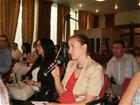 Because the world is changing, the challenges as well, and there is no way for us to respond and, moreover - to win if we are bound by old fears and new political legends. And no matter what turn the accession process of Turkey might take, the country will continue to be a big, strong and influential neighbour of Bulgaria. This is why the question is how can we benefit as much as possible from this neighbourhood, how to benefit from our relations with Turkey, without manifesting neither slavery complexities, nor being too self confident.
Because the world is changing, the challenges as well, and there is no way for us to respond and, moreover - to win if we are bound by old fears and new political legends. And no matter what turn the accession process of Turkey might take, the country will continue to be a big, strong and influential neighbour of Bulgaria. This is why the question is how can we benefit as much as possible from this neighbourhood, how to benefit from our relations with Turkey, without manifesting neither slavery complexities, nor being too self confident.
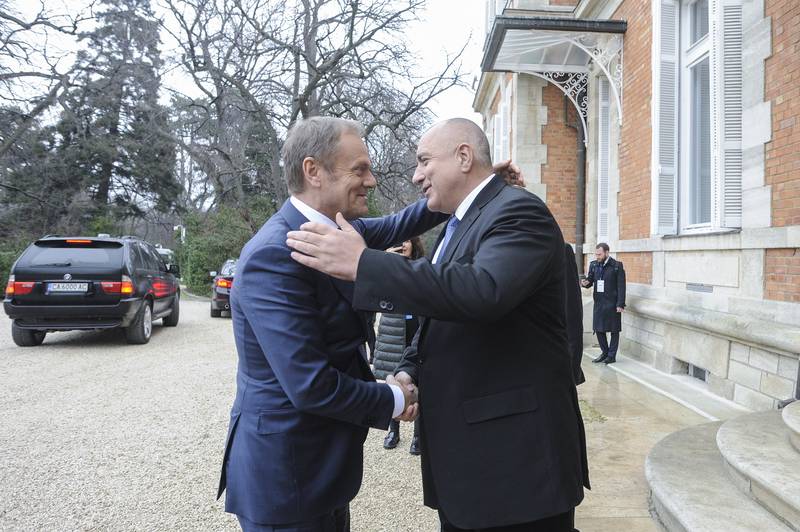 Donald Tusk, Boyko Borissov | © Council of the EU
Donald Tusk, Boyko Borissov | © Council of the EU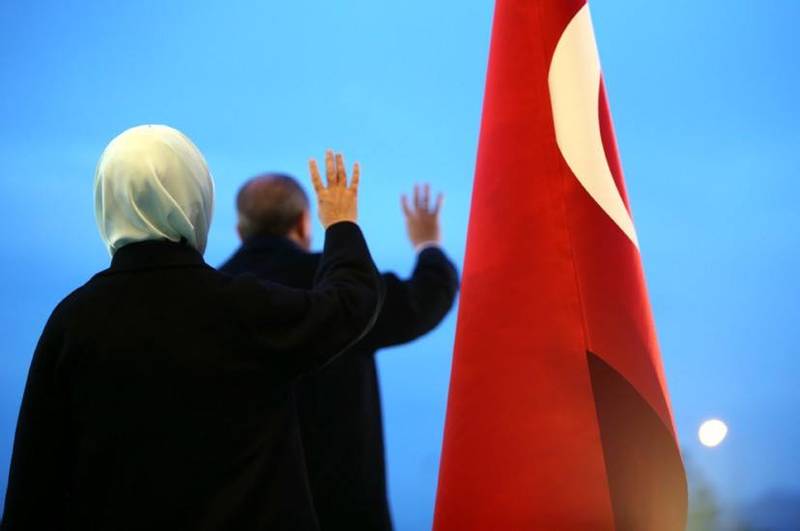 | © Turkey Presidency
| © Turkey Presidency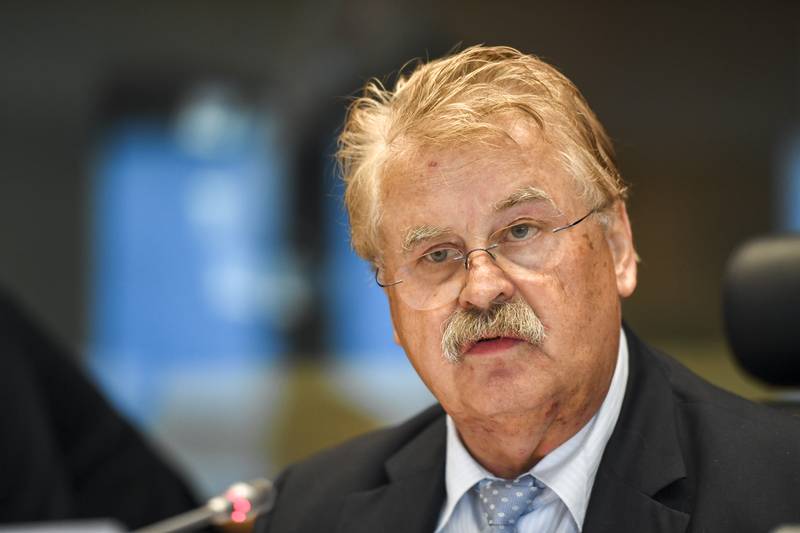 Elmar Brok | © European Parliament
Elmar Brok | © European Parliament